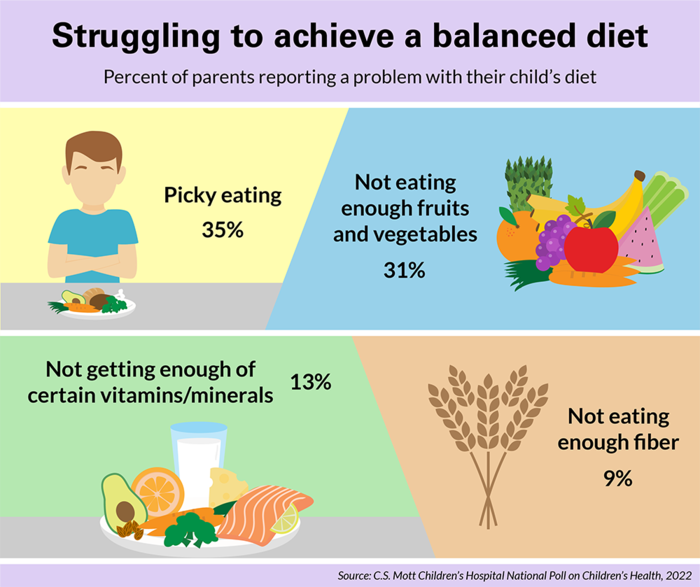Half of parents regularly give children a dietary supplement, poll finds
About 50 per cent of parents find it challenging to ensure their child gets a well-balanced diet, reports Aisha Rimi


Half of parents regularly give their child a dietary supplement to ensure they are getting a balanced diet, according to a new poll.
The report, based on the responses from 1,251 parents with at least one child aged between one to 10, also showed that more than half of parents agreed that it is difficult to get their children to eat a well-balanced diet.
Conducted by the University of Michigan Health C.S. Mott Children’s Hospital in the US, the poll reaffirmed that picky eating was a challenge facing many parents, with about a third of parents calling their child a picky eater.
A third of those surveyed also said they do not think their child eats enough fruits and vegetables.
Roughly 13 per cent are worried their children are not getting enough of certain vitamins and minerals, while 9 per cent said their child needs more fibre in their diet, the poll found.
“A balanced diet helps children get the nutrients they need for healthy growth and development,” said Mott Poll co-director Sarah Clark, M.P.H. “An unhealthy diet, on the other hand, can negatively affect short and long-term health outcomes as well as school performance.
“Still, the reality for many parents is that getting children to eat healthy foods isn’t always easy. Our poll finds that many turn to dietary supplements as a solution but may not always consult with a health provider.”
Another potential barrier to children consuming a well-balanced diet is the cost, with half of the parents agreeing that providing their child with a healthy diet was more expensive.
“We know that fresh, healthy foods can be more expensive than processed or packaged items that are often higher in sodium and added sugars,” Ms Clark said. “This can make it especially frustrating for parents when children waste or refuse to eat healthy foods.”
Most parents polled have given their child dietary supplements, with over 75 per cent using multivitamins. Close to half had also provided their kids with probiotics, which are live bacteria and yeast taken to help digestion by enhancing the number of good microbes in the gut.
More than a fifth have used Omega 3 supplements, fatty acids that support cell growth and brain development, and about a third of parents say their child has tried but does not take supplements regularly.

Among parents who have given their child supplements, four in five say they chose products made specifically for children.
The US National Centre for Complementary and Integrative Health (NCCIH) advises parents to ask their child’s health care provider about the effectiveness and possible risks of any complementary health approaches they are considering or already using for their child. However, only about two in five say they discussed supplement use with their child’s health care provider.
“Dietary supplements are often intended to enhance the amount of vitamins children consume through a regular diet,” Clark said. “But parents may not always know whether their child is getting proper nutrition.
“The use of dietary supplements in children is an important health decision to discuss with doctors, but less than half of parents who have given their child a supplement talked to their child’s health provider.”
It’s unclear, she says, if this lack of consultation is the result of providers not asking about the child’s nutrition, parents not thinking supplement use warrants professional advice or another reason.
Parents in lower-income households were also less likely to talk about supplement use with their child’s health care provider, compared to higher-income parents, according to the report.
“Providers should be diligent about discussing nutrition with families so they understand what a healthy diet should include and are using supplements appropriately,” she said. “In situations where families can’t afford to provide a healthy diet, providers may direct parents to social service programs that can help.”
As supplements are classified by the US Food and Drug Administration as food, they do not receive the same premarketing evaluation and review as medications, Ms Clark added.
“There is limited research on the safety and efficacy of supplements and potential side effects for kids. But some parents may not be aware that supplements do not undergo rigorous FDA testing and approval,” she said.
“To minimize the risks of supplement use, parents should share concerns about their child’s diet with a paediatrician who can help them identify the best strategies to improve the nutritional quality of their child’s diet and determine whether supplements are recommended.”
About 4,600 children end up in the emergency room each year due to dietary supplements, says the NCCIH. The government agency also warns that many dietary supplements haven’t been tested on children as their bodies aren’t fully developed – therefore their side effects on children may differ from those on adults.






Join our commenting forum
Join thought-provoking conversations, follow other Independent readers and see their replies
Comments